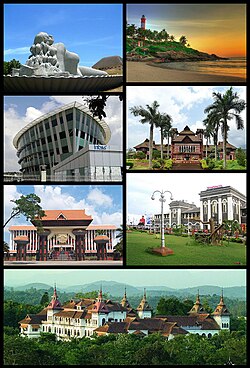Thiruvananthapuram metropolitan area
Thiruvananthapuram metropolitan area
തിരുവനന്തപുരം നഗരവല്കൃത സമൂഹം | |
|---|---|
Metropolitan City | |
 From top clockwise: Kerala Legislative Assembly, Padmanabha Swamy Temple, Kovalam Beach, Napier Museum, Kerala Institute of Medical Sciences, Bhavani building in Technopark | |
| Country | |
| State | Kerala |
| District | Thiruvananthapuram |
| Government | |
| • Body | Thiruvananthapuram Nagarasabha (തിരുവനന്തപുരം നഗരസഭ ) |
| Area | |
| • Total | 250 km2 (100 sq mi) |
| Population (2011)[1] | |
| • Total | 1,687,406 |
| • Density | 6,700/km2 (17,000/sq mi) |
| Languages | |
| • Official | Malayalam, English |
| Time zone | UTC+5:30 (IST) |
| Vehicle registration | KL 01, KL 16, KL 19, KL 20, KL 21, KL 22, KL 15(KSRTC) |
| Nearest city | Thiruvananthapuram |
| Sex ratio | 1070 ♂/♀ |
| Lok Sabha constituency | Thiruvananthapuram, Attingal |
| Planning agency | Thiruvananthapuram Development Authority (TRIDA) |
| Civic agency | Thiruvananthapuram Nagarasabha (തിരുവനന്തപുരം നഗരസഭ ) |
- For the district article, see Thiruvananthapuram district
Thiruvananthapuram Urban Agglomeration is the 5th largest Urban Agglomeration in the state consisting of the city of Thiruvananthapuram (Trivandrum), the capital and the largest city in the Indian state of Kerala and its satellite towns. This UA consists of Thiruvananthapuram (Trivandrum) city, the municipalities of Attingal, Nedumangad and Neyyattinkara,[citation needed] three outgrowths and 24 census towns. The total population is 1,687,406, which includes 815,200 males and 872,206 females as per 2011 census.[1]
Demographics
According to Statistics Bureau report, as of 2013, the Thiruvananthapuram Urban Agglomeration has a population of 2,697,706, of which 1303261 (48.31% of the population) were male and 1394445(51.69% of the population) were female. The area has a literacy rate of 98.24% making it the most literate Metropolitan Region in India. TMR contributes to 39% of the states GDP above Cochin which contributes 26% and accounts for 87% of the states IT exports.
Components
| No. | Location | Type |
|---|---|---|
| 1 | Thiruvananthapuram | City corporation |
| 2 | Kazhakkoottam | Outgrowth (Merged to city corporation in 2010) |
| 3 | Sreekaryam | Outgrowth (Merged to city corporation in 2010) |
| 4 | Kudappanakunnu | Outgrowth (Merged to city corporation in 2010) |
| 5 | Vattiyoorkavu | Outgrowth (Merged to city corporation in 2010) |
| 6 | Kovalam | Outgrowth (Merged to city corporation in 2010) |
| 7 | Attingal | Municipality |
| 8 | Nedumangad | Municipality |
| 9 | Neyyattinkara | Municipality |
| 10 | Alamcode | Census Town |
| 11 | Keezhattingal | Census Town |
| 12 | Vakkom | Census Town |
| 13 | Kizhuvalam - Koonthalloor | Census Town |
| 14 | Edakkode | Census Town |
| 15 | Azhoor | Census Town |
| 16 | Vattappara | Census Town |
| 17 | Karakulam | Census Town |
| 18 | Uliyazhathura | Census Town |
| 22 | Kalliyoor | Census Town |
| 23 | Venganoor | Census Town |
| 24 | Vilappil | Census Town |
| 25 | Kulathummal | Census Town |
| 26 | Malayinkeezhu | Census Town |
| 27 | Vilavoorkkal | Census Town |
| 28 | Pallichal | Census Town |
| 29 | Athiyannur | Census Town |
| 30 | Kanjiramkulam | Census Town |
| 31 | Veiloor | Census Town |
| 32 | Pallippuram | Census Town |
| 33 | Iroopara | Census Town |
| 34 | Aryanad | Census Town |
Future Expanssion
Monorail
Template:Thiruvananthapuram Monorail Map
Trivandrum Capital Region
The Trivandrum Capital Region or TCR is the area proposed by TRIDA (Trivandrum Development Authority) by joining adjacent municipalities of Nedumangad, Neyyattinkara, Varkala and Attingal with Thiruvananthapuram city.[2] This was proposed for planning the development of the capital region of Kerala more effectively. The TCR covers most part of the Thiruvananthapuram UA and eyes to develop the surrounding municipalities as satellite towns to the main city.
References
- ^ a b India UA Population. "Urban Agglomerations/Cities having population 1 million and above" (PDF). Provisional Population Totals, Census of India 2011. The Registrar General & Census Commissioner, India. Retrieved 16 October 2011.
- ^ TRIDA - Seminar on TCR
